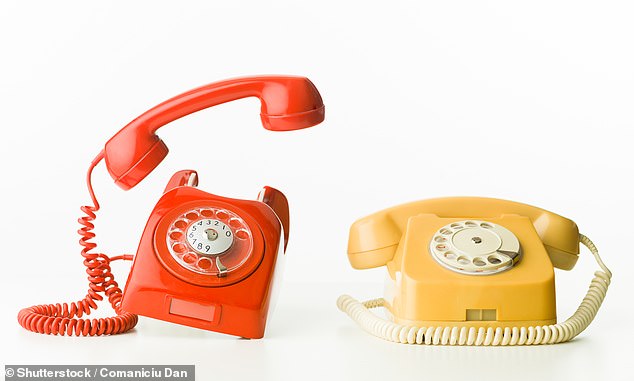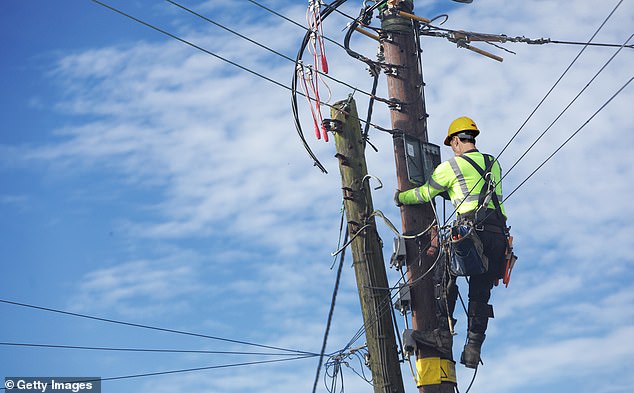We have received a deluge of letters from BT customers complaining of chaos and confusion around a advance to switch Britain’s 29 million homes over to new digital landlines.
The flood of complains has landed at Money Mail and This is Money after our stories on the digital landline switch.
One customer lost the phone number she had used for 50 years after her old copper-wire landline was switched off and a new internet telephone was installed at her home.
Other customers say their new digital landlines stop working every time the internet goes down. For those who live in rural villages, that can be a regular occurrence.
Customers also complain that the £20 phone adapters being handed out by BT don’t work with their old handsets.
And many readers tell us they are being forced to help their elderly parents with the switchover because it is proving so complicated. They say the help provided by BT has been woefully inadequate.

Number’s up: One customer has lost the phone number she has used for 50 years after she was switched to a new internet telephone
One 90-year-old said he was left without a landline for more than ten days due to technological issues.
In the next couple of years, the Digital Voice programme will advance ten million BT customers off traditional copper-wire phone lines to fibre cables that use new Voice over Internet Protocol (VoIP) technology to make calls.
In total 29 million homes must make the change by 2025. Phone numbers should not be affected by the switch, BT says.
That’s not the experience of retired shepherdess Gillian Allen, who found calls from family and friends suddenly stopped on October 2 when BT switched her landline off in favour of a digital line.
But rather than sending an engineer to fix the issue, the telecoms giant took away the number she’d used for 50 years — and replaced it with a new number that had a different area code.
The telecoms giant is adamant that customers should not have to change their phone number as part of its BT’s switch to Digital Voice.
Yet Gillian, 69, is one of dozens of readers who have contacted Money Mail and This is Money to complain about an erratic system they say is simply not fit for purpose and experiences that BT itself admits should not be happening.
Worse still is BT’s handling of elderly customers during the digital switch, which reader Joss Barnes describes as having been ‘absolutely despicable’ in the case of their elderly uncle.
The stack of reader complaints against BT makes Gillian’s story not particularly unusual, but distressing nonetheless.

Faults: Some customers say their new digital landlines stop working every time the internet goes down in their area
Gillian lives with her brother, Bob, 77, in the village of Nateby, Cumbria, and says: ‘It has been a comedy of errors over the past couple of months — and despite numerous phone calls, the problem was not solved. Instead, it was more confusing by having our phone number changed.’
She adds: ‘Fortunately, we had a mobile phone so we could still convey with the outside world.
We had no intention of using the new landline because people would think we’d moved home.’
Despite having received letters and cards from BT informing them of the changes, Gillian was unaware of the date of the switch. But she says it was on October 2 that calls stopped coming in.
Friends and family said they tried to ring but no one had answered the phone — while Gillian said the phone simply did not ring.
She contacted BT, who told her to pull her phone line out of the traditional socket in the wall and plug it into the computer hub instead.
Oddly, she says calls made by friends whose lines had already been switched to a digital service could get through.
It was traditional analogue lines that appeared to be blocked. Baffled by the problem, a BT engineer gave the family a new ‘temporary number’ in November.
But Gillian did not get her old number back. She says: ‘When I called asking for the old phone number back, BT told me it had been discontinued.’
It was only after Money Mail intervened on her behalf that she got her old number back last week. BT admits that due to ‘technical issues’, Gillian’s original number did not ‘port fully’.
It failed to comment on what this means or how many other customers have been affected. A BT spokesman says: ‘We are really sorry for the issues Gillian has experienced.’
Stan Bibby is one of many other BT customers who has contacted us with similar technology glitches. He says: ‘When you purchase the £20 adapters, they do not work with many older handsets — well, certainly not with mine.
‘I could still get a dialling tone and phone out after the digital switch, but my phone no longer rang when I received an incoming call.’
The switch is not only affecting phone calls — it’s detrimental to older people’s independence.
Another reader wrote in about her elderly mother’s struggles to handle on her own, adding: ‘This new technology only adds to the confusion.
‘It is deeply frustrating for her because she is totally capable but needs to rely on a younger generation to handle the unnecessary change.
‘I am also with BT and was told the old system has run its course. Nonsense! BT replaced my copper phone wires only a couple of years ago, and I think they could be good for at least another 50 years.’
Another reader who contacted us was Patrick, 87. He wrote: ‘I have been a BT customer for more than 67 years and had hoped this digital switch would not be forced upon us. I will not be bullied into accepting this change.’
Yet even BT engineers struggle to resolve problems for customers who need help with the switch.
Marnie Simmans, 85, a retired United Nations secretary from Reigate, Surrey, was forced to switch to Digital Voice just over a year ago — only weeks before BT had to halt its rollout due to shortcomings in the service.
The widow, whose husband, Albert, a former electronics engineer, died four years ago, says: ‘I was sent a new digital phone in the post with instructions on how to set it up.
‘I refused to do it as I did not want to be switched over — so BT arranged for an engineer to come out and do it. Unfortunately, he seemed to struggle, too — and the phone now switches off when the internet goes down.
‘It has stopped working half a dozen times over the past year.’ Marnie says her new phone service is much less reliable than it was.
She adds: ‘I cannot grasp how BT can get away with this. Surely, we should be working to improve services — not make them worse.’
Last year, regulator Ofcom raised concerns over the programme, warning BT did not have enough measures in place to uphold vulnerable customers in a power cut if they needed to call 999 because digital phones must be plugged into an electricity socket to work, and do not function in a power cut.

Big switch: In the next couple of years, the Digital Voice programme will advance ten million customers off traditional copper wire phone lines to internet fibre cables
Vulnerable households need to ensure they have an alternative in place, such as a mobile phone or an emergency battery pack to plug in for the landline phone.
The telecoms giant suspended the rollout until last summer, when it put additional measures in place.
BT has started offering ‘free’ £85 battery packs to those most in need if there is a power cut so they do not lose contact. But batteries will not help if the internet itself also goes down because the phone relies on the digital connection.
Concerned customers can demand a ‘free’ £80 hybrid phone that uses mobile phone signals rather than the internet. But it won’t help people such as Marnie who live in areas with ‘patchy’ or no mobile phone signal.
Retired police officer Sandra Wrench, of Kempston, Bedfordshire, says BT’s advice for vulnerable people to call on family or friends if they need help with the switch is not realistic.
‘As a police officer, I learned there are a huge number of elderly people without any uphold,’ she says. ‘It does not matter how many times BT emails or contacts them by post — a huge number will be confused by the switch and not realise that on a set date they could be cut off from the outside world.
It is ridiculous — why can’t BT leave landlines in place for the vulnerable and just change them as required with a visit.’
Laurence Walterson, 90, got in touch as a concerned BT customer who lives alone and has hearing and visual problems.
He says: ‘My daughter spent hours on her mobile phone trying to get hold of BT staff to help me with the digital change — with frequent promises to call back not materialising.
‘I was left for 11 days without a landline. So much for BT’s protocol of getting vulnerable people’s problems resolved within 48 hours.’
The telecoms giant suggests that if there is a power cut or their broadband goes down, ‘customers should use their mobile as an alternative, if able’.
When asked about vulnerable people without family or friends able to help, BT says: ‘We inspire customers with any issues, questions or concerns to get in touch.’
The rollout of Digital Voice started in the capital in the autumn, but Ron Rensham, from Congleton, Cheshire, warns that if his experience is anything to go by, Londoners can also expect disruption.
‘Despite not living in a remote area and wanting to adopt the technology, it has been a shambles,’ he says.
‘After more than a year of BT engineers struggling to install broadband and phone upgrades, I now wonder how on earth BT will be able to hit its two-year roll-out target.
‘It seems to be ploughing ahead with the plans irrespective of the consequences to the customer.’
toby.walne@dailymail.co.uk
Some links in this article may be affiliate links. If you click on them we may earn a small commission. That helps us fund This Is Money, and keep it free to use. We do not write articles to inspire products. We do not allow any commercial relationship to affect our editorial independence.



